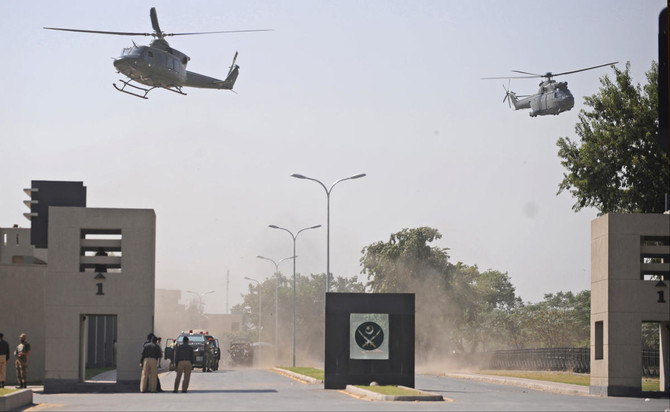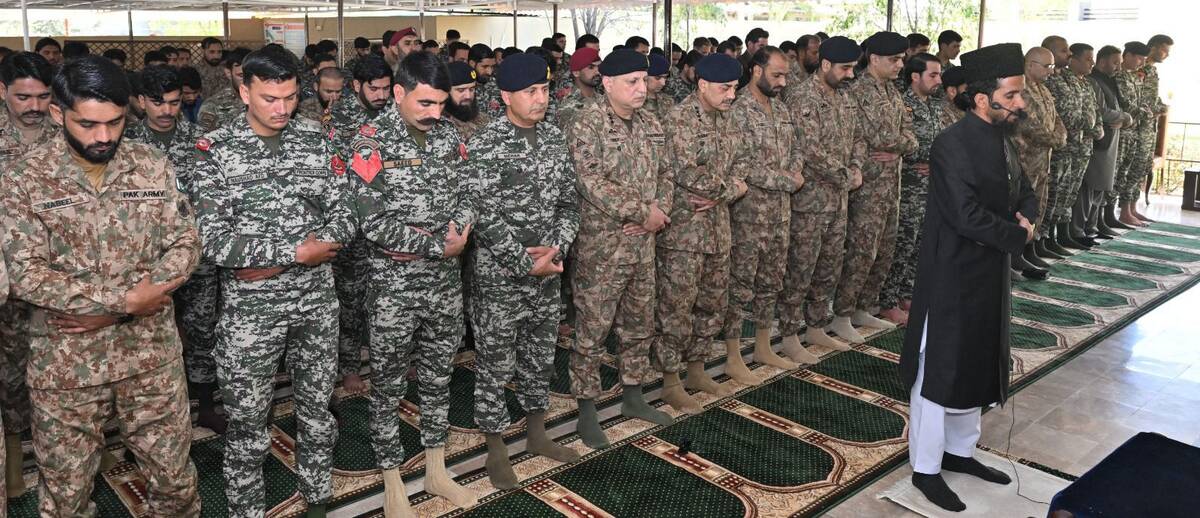ISLAMABAD: Military experts have poured cold water on Pakistani government plans to move the army’s general headquarters from the garrison city of Rawalpindi to a proposed new Rs.100 billion ($950 million) defense complex next to the air force and navy HQs in Islamabad.
“This seems impossible because the costs are too high,” Shaukat Qadir, a security analyst and former Pakistani infantry officer, told Arab News. Even if it were a serious plan it would take years to materialize, he said.
Rahat Latif, a retired major general, said: “My information is that the GHQ is not going to be shifted from the present location.
“It requires a colossal amount of money, and it is not a joke to shift the GHQ when the country does not have enough resources to finance it.” About 2,450 acres of land acquired for the project was likely to be used for army administration and logistics, he said.
“There is no timeframe given, but this year it’s impossible,” a defense ministry official said, and even 2018 was unlikely.
Defense Secretary Zamir Ul Hassan Shah briefed the Senate Standing Committee on the plan in October. He said an estimated 5,000 families living on their ancestral land were moved when the area became the army’s property in 2005. However, a report based on a city development authority document claimed the land was actually allocated in 1981.
Hassan said the defense complex would be financed by the army, but military analyst Dr. Ayesha Siddiqa said the army may ask the government to bankroll the project. “This money could be used … for repaying the country’s debt,” she told Arab News.
Inter-Services Public Relations (ISPR), the army’s media arm, declined to comment. The ISPR building itself has been magnificently rebuilt, leaving no trace of its previous colonial era architecture. “Not sure, can’t say anything about it,” an army officer said when asked if ISPR would be moving along with the GHQ.
Reports from 2005, citing the then-ISPR Director General, say the decision to build the new military headquarters in Islamabad was ordered by Prime Minister Zulfiqar Ali Bhutto on March 29, 1972, a matter which was raised following the communication breakdown between the combined military services during the 1965 India-Pakistan war.
The idea was to build a “Pentagon kind of a structure,” which would make it easy to pass files, but “if you don’t have conceptual clarity … and conceptual integration then physical proximity is not going to change things,” said Siddiqa. The army considered itself superior to the other two defense services and was usually not willing to share information with them, she said. “The other problem I see is that there would be so much security around the GHQ, it would make life for the people in Islamabad quite difficult.”
The move from the inadequate and aging GHQ facility, built in 1852, was originally envisaged by the mid-1990s. However, delays and unknown issues hampered the plan.
Work on the defense complex was suspended indefinitely by the then army chief Gen. Ashfaq Pervez Kayani in October 2008, owing to a cash-strapped economy. Pakistan’s economic situation has worsened since then.
Experts dismiss $950m plan for new Pakistan army GHQ
Experts dismiss $950m plan for new Pakistan army GHQ

Pakistan saw highest number of militant attacks during Ramadan in a decade

- The Pak Institute for Peace Studies reported at least 84 attacks during Ramadan, which ended Sunday in Pakistan
- Some militant groups previously paused hostilities for Ramadan, but overall violence has increased in recent years
ISLAMABAD: Pakistan saw the highest number of militant attacks during the Muslim holy month of Ramadan in a decade, a think tank reported Monday.
Some militant groups previously paused hostilities for Ramadan, but the country has seen an overall increase in violence in recent years.
The Pak Institute for Peace Studies reported at least 84 attacks during Ramadan, which ended Sunday in Pakistan. It reported 26 attacks during last year’s Ramadan.
The Pakistani Taliban unilaterally ended a ceasefire with the government in November 2022, while the Baloch Liberation Army has developed its capabilities to stage elaborate attacks. Both have contributed to the rise in violence.
The outlawed BLA was behind a train hijacking on March 11 in the southwest province of Balochistan that killed at least 25 people.
Another think tank, the Pakistan Institute for Conflict and Security Studies, recorded 61 attacks in the first three weeks of Ramadan. There were 60 total attacks in the previous Ramadan, it said.
It also said this was the deadliest Ramadan in a decade for security personnel, with 56 killed between March 2 and March 20.
Abdullah Khan, managing director of the Pakistan Institute for Conflict and Security Studies, cited an overall escalation in militant activity.
“There has been a unification of different groups,” Khan said. “Baloch factions are joining hands. In some areas (of the northwest), the Hafiz Gul Bahadur faction is more lethal than the Pakistani Taliban, it is competing with them.”
He said there was also a revival of banned organizations like Lashkar-e-Islam, which operates from the northwest province of Khyber Pakhtunkhwa.
Pakistan accuses the Taliban government in neighboring Afghanistan of giving haven to such groups, saying militants have thrived since the Taliban returned to power in 2021. Kabul rejects that.
Khan also pointed to intelligence failures, including those that led to the train hijack in Balochistan, and the widening trust gap between the state and the population: “It’s important to get back public support. The public is the first line of defense.”
Pakistan army chief spends Eid with troops on Afghan border amid surge in militancy

- Pakistan ranks as the second-most affected country by terrorism, according to The Global Terrorism Index 2025
- Islamabad has blamed the surge on militant groups operating out of Afghanistan, an allegation denied by Kabul
ISLAMABAD: Pakistan’s Army Chief General Asim Munir on Monday visited the northwestern Khyber Pakhtunkhwa (KP) province, where he spent the first day of Eid Al-Fitr with officers and troops deployed along Pakistan’s border with Afghanistan, the Pakistani military said.
Gen. Munir visit comes at a time when Pakistan security forces have been fighting a surge in militant attacks in the country’s western provinces of KP and Balochistan.
Pakistan is battling twin insurgencies: one led by religiously motivated groups, mainly the Tehreek-e-Taliban Pakistan (TTP), in KP and the other by ethno-nationalist Baloch separatists in Balochistan.
During his visit to KP’s South Waziristan and Dera Ismail Khan districts, the army chief extended Eid greetings to the troops and lauded their “unwavering dedication and exemplary service to the nation.”
“Your commitment and resilience not only secure our homeland but also exemplify your profound love for Pakistan,” he was quoted as saying by the Inter-Services Public Relations (ISPR), the Pakistani military’s media wing.

Pakistan ranks as the second-most affected country by terrorism, according to The Global Terrorism Index 2025. Militancy-related deaths surged by 45 percent, rising from 748 in 2023 to 1,081 in 2024, marking one of the steepest global increases.
At least 1,141 Pakistanis were killed or injured from Jan. 1 till Mar. 16 in “terrorism” incidents, Minister of State for Interior Tallal Chaudry said this month.
Islamabad has frequently accused neighboring Afghanistan of sheltering and supporting militant groups that launch cross-border attacks in Pakistan’s western regions. Afghan officials deny involvement, insisting Pakistan’s security issues are an internal matter of Islamabad.
Speaking with officers and troops deployed on the border, the army chief lauded the morale of the armed forces, law enforcement agencies (LEAs) and the people of Khyber Pakhtunkhwa for braving the “menace of terrorism,” according to the ISPR.
“The COAS (chief of army staff) attributed their achievements to the sacrifices of our martyrs and those who are committed toward the greater cause of peace and stability,” it added.

Cookbook ‘Pakistan’ serves up recipes for Eid mainstays: mutton pulao, garlic chutney, sweet seviyan
Cookbook ‘Pakistan’ serves up recipes for Eid mainstays: mutton pulao, garlic chutney, sweet seviyan

- As Ramadan ends, Maryam Jilani’s new cookbook sheds light on Pakistan’s varied cuisine and culinary traditions
- Recipes reflect diverse nature of Pakistan’s migrant communities and influences on its food from India, China and beyond
A mainstay at the Eid Al-Fitr table of award-winning food author Maryam Jillani’s grandmother, Kulsoom, was mutton pulao, an aromatic rice dish prepared in a gently spiced bone broth. It’s both comforting and celebratory — and can be absolutely revelatory when paired with a sharp condiment like a garlic chutney.
Dessert included seviyan, sweetened vermicelli noodles simmered in spiced milk.
Here are recipes from Jillani’s new cookbook, “Pakistan,” for the mutton, chutney, and seviyan:
Mutton Pulao (Aromatic Rice with Mutton)
Serves 6 to 8 as a main course
Ingredients:

About 3 pounds bone-in mutton, lamb or beef, cut into 1- to 1 1/2-inch pieces
4 medium yellow onions, halved and thinly sliced
4 whole cloves
2 black cardamom pods
One 2-inch cinnamon stick
1 tablespoon cumin seeds
2 tablespoons garlic paste
2 tablespoons salt, or to taste
1/3 cup vegetable oil
3 cups basmati rice, rinsed in several changes of water
Directions:
Fill a large pot with 8 to 10 cups water. Add the mutton, half of the onions, the whole cloves, cardamom pods, cinnamon stick, cumin seeds, 1 tablespoon of the garlic paste, and 1 tablespoon of the salt. Cover the pot with a tight-fitting lid. Bring to a boil over high heat, then lower the heat to maintain a gentle simmer. Cook the mutton for 1 to 2 hours, depending on the quality of the meat, until it is tender. With a slotted spoon, remove the meat. Strain the solids from the liquid, return the liquid to the pot, and place it by the stove. Discard the solids.
In a clean, heavy-bottomed pot, heat the oil until it begins to shimmer. Add the remaining onions and fry on medium-low heat for 12 to 15 minutes until they are a deep golden-brown color. Take care to not let them burn. Stir in the remaining garlic paste and cook for 30 seconds to 1 minute, until the mixture no longer smells raw.
Increase the heat to high and add the mutton and remaining 1 tablespoon salt. Sear the meat, 5 to 7 minutes, until it has browned slightly. Pour in 6 cups of the strained mutton broth (put any leftover broth in airtight containers and freeze for later use). Taste and add more salt as needed. Bring to a boil, then lower the heat to maintain a simmer. Carefully pour in the rice and let cook for about 10 minutes until the water completely evaporates.
Wrap a tight-fitting lid with a clean kitchen towel and place it securely on the pot. Turn the heat to the lowest possible setting and let the rice steam for at least 10 to 12 minutes until fluffy. Carefully transfer the pulao to a serving platter and fluff with a fork.
Lahsun ki Chutney (Garlic Chutney)
Aida Khan, a London-based entrepreneur and chef, shared her mother’s recipe for this vibrant, punchy lahsun ki chutney. It’s very spicy, so a little goes a long way. Refrigerate this chutney in an airtight container for up to two weeks.
Makes 1 cup
Ingredients:
4 heads garlic, cloves separated and peeled
1 1/2 small red onions, roughly chopped
1/4 cup red chili flakes
1 bird’s eye chile (optional)
1/2 cup vegetable oil
1 teaspoon salt, or to taste
2 teaspoons lemon juice
Directions:
In a food processor, combine the garlic, onions, chile flakes, and bird’s eye chile (if using), and blitz until you have a thick paste.
In a small saucepan, heat the oil over medium heat until it shimmers. Add the garlic and onion paste and salt. Bring it to a simmer, cover the pan, and reduce the heat to low. Cook the chutney for 35 to 40 minutes, stirring occasionally to make sure it doesn’t stick to the pan, until the garlic and onions have caramelized and the chutney’s color deepens.
Remove the pan from the heat. Stir in the lemon juice and serve.
Seviyan (Sweetened Roasted Vermicelli)

Serves 12
Ingredients:
1/4 cup ghee
6 green cardamom pods, cracked
5 1/2 ounces seviyan (semolina vermicelli)
8 1/2 cups full-fat milk
3/4 cup sugar
2 tablespoons blanched sliced almonds
Directions:
In a heavy-bottomed pot over medium heat, melt the ghee and heat it until it begins to shimmer. Add the cardamom pods and fry for about 30 seconds until fragrant. Add the seviyan and fry over medium heat for 2 to 3 minutes until browned slightly. Gradually pour in the milk and bring the pudding to a boil. Lower the heat to medium and stir in the sugar until it dissolves. Keep the milk at a gentle simmer and cook for 15 to 20 minutes, stirring continually, until the milk thickens but the seviyan still has some bite.
Transfer the seviyan to a serving bowl. Top with sliced almonds. Let it cool to room temperature before serving. To store, transfer to an airtight container, refrigerate, and use within 2 to 3 days.
Pakistan to dispatch 70 tons of aid to Myanmar as quake death toll passes 2,000

- With communications down, the true scale of the disaster has yet to emerge and the death toll is expected to rise
- At least 19 deaths have also been confirmed in Bangkok, where the quake caused a 30-story tower block to collapse
KARACHI: Pakistan will dispatch 70 tons of relief goods to Myanmar in the wake of a deadly earthquake that has killed more than 2,000 people, Prime Minister Shehbaz Sharif’s office said on Monday.
The statement came after Sharif spoke with Myanmar junta chief Min Aung Hlaing and extended his condolences over the loss of precious lives and property due to the devastating 7.7-magnitude earthquake that struck on Friday.
The Pakistan prime minister assured his country was ready to provide any assistance to alleviate the suffering of those affected by the earthquake, according to Sharif’s office.
“National Disaster Management Authority of Pakistan would be dispatching around 70 tons of relief goods to Myanmar in two sorties that would arrive within the next 48 hours to help the earthquake affected people,” he was quoted as saying.
The development came as Myanmar declared a week of national mourning over the devastating earthquake, with hopes fading of finding more survivors in the rubble of ruined buildings.
The tempo and urgency of rescue efforts have wound down in Mandalay, one of the worst-affected cities and the country’s second-largest, with more than 1.7 million inhabitants. However, with communications down in much of Myanmar, the true scale of the disaster has yet to emerge and the death toll is expected to rise significantly.
Sharif expressed his confidence in the resilience of the people of Myanmar and hoped that they would soon overcome this natural calamity, according to his office.
The Myanmar junta chief thanked the prime minister and the people of Pakistan for “standing with the people of Myanmar in this hour of need.”
At least 19 deaths have also been confirmed hundreds of kilometers away in Thailand’s capital Bangkok, where the force of Friday’s quake caused a 30-story, under-construction tower block to collapse.
Pakistan plans to expel 3 million Afghans from the country this year

- It’s the latest phase of a nationwide crackdown launched to expel foreigners living in Pakistan illegally
- The expulsion campaign has drawn fire from rights groups, the Taliban government and the United Nations
PESHAWAR: Pakistan plans to expel 3 million Afghans from the country this year, as a deadline for them to voluntarily leave the capital and surrounding areas expired on Monday.
It’s the latest phase of a nationwide crackdown launched in October 2023 to expel foreigners living in Pakistan illegally, mostly Afghans. The campaign has drawn fire from rights groups, the Taliban government, and the UN
Arrests and deportations were due to begin April 1 but were pushed back to April 10 because of the Eid Al-Fitr holidays marking the end of Ramadan, according to government documents seen by The Associated Press.
About 845,000 Afghans have left Pakistan over the past 18 months, figures from the International Organization for Migration show.
Pakistan says 3 million Afghans remain. Of these, 1,344,584 hold Proof of Registration cards, while 807,402 have Afghan Citizen Cards. There are a further 1 million Afghans who are in the country illegally because they have no paperwork.
Pakistan said it will make sure that Afghans do not return once deported.
Authorities wanted Afghan Citizen cardholders to leave the capital Islamabad and Rawalpindi city by March 31 and return to Afghanistan voluntarily or be deported.
Those with Proof of Registration can stay in Pakistan until June 30, while Afghans bound for third-country resettlement must also leave Islamabad and Rawalpindi by March 31.
Authorities have said they will work with foreign diplomatic missions to resettle Afghans, failing which they will also be deported from Pakistan.
Tens of thousands of Afghans fled after the Taliban takeover in 2021. They were approved for resettlement in the US through a program that helps people at risk because of their work with the American government, media, aid agencies, and rights groups.
However, President Donald Trump paused US refugee programs in January and 20,000 Afghans are now in limbo.
The Taliban want Afghan refugees to return with dignity
“No Afghan officials to be made part of any committee or formal decision-making process,” one of the documents said about the expulsion plans.
A spokesman for Afghanistan’s Refugee Ministry, Abdul Mutalib Haqqani, told The Associated Press that Pakistan was taking decisions arbitrarily, without involving the UN refugee agency or the Taliban government.
“We have shared our problems with them, stating that unilaterally expelling refugees is neither in their interest nor ours,” said Haqqani. “It is not in their interest because expelling them in this way raises hatred against Pakistan.
“For us, it is natural that managing so many Afghans coming back is a challenge. We have requested they should be deported through a mechanism and mutual understanding so they can return with dignity.”
Two transit stations will be set up in the northwest province of Khyber Pakhtunkhwa to help with deportations. One will be in Nasir Bagh, an area in the Peshawar suburbs. The second will be in the border town of Landi Kotal, some 7 kilometers from the Torkham crossing.
Afghans are unsure of their future in a country they don’t know
It is not clear what will happen to children born in Pakistan to Afghan parents, Afghan couples with different document types, and families where one parent is a Pakistani citizen and the other is Afghan. But officials indicated to the AP that social welfare staff will be on hand to help with such cases.
Omaid Khan, 30, has an Afghan Citizen Card while his wife has Proof of Registration. According to Pakistani government policy, he has to leave but his wife can stay until June 30. Their two children have no documents, including passports or identity cards from either country.
“I am from Paktia province but I have never been there and I am not sure about my future,” he said.
Nazir Ahmed was born in the southwest Pakistani city of Quetta and has never been to Afghanistan. His only connection to the country was through his father, who died in Quetta four years ago.
“How can we go there?” said Ahmed, who is 21. “Few people know us. All our relatives live in Quetta. What will we do if we go there? We appeal to the Pakistani government to give us some time so we can go and find out, at least get some employment.”









